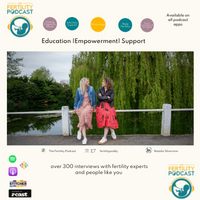Ovulation Induction with Alice Rose
This week we’re joined by Alice Rose who you may know on Instagram as @thisisalicerose. Alice is a former fertility patient, mum of two, campaigner and a mindset mentor. Alice’s ‘Think not What to Say’ campaign has been a trailblazer within the community, helping to bridge the disconnect between patients and their doctors and help friends and family to communicate better with their loved ones navigating a fertility journey.
On her own fertility journey Alice, who has PCOS, had numerous rounds of treatment, including ovulation induction. Kate explains what happens during ovulation induction. Often it is the first treatment you may be offered, particularly if you’re not ovulating. You may be offered Clomid or letrozole. These medications increase FSH to encourage the ovaries to produce follicles, one of which will mature and be released at ovulation.
In her treatment, Alice responded well to the first round of clomid but was really confused when in the second round she didn’t ovulate at all. Alice talks about not feeling very informed on what to expect during her treatment, including not being aware of the risks associated such as Ovarian Hyperstimulation (OHSS). Following a private consultation, Alice felt more informed and decided to continue with her rounds of clomid but still having varying degrees of response. Alice talks about how she felt as though she had to self-advocate which was hard to do.
We discuss egg quality when it comes to PCOS and long cycles, and how many rounds of ovulation induction you can have – which is generally 6 cycles. Kate discusses taking back control and maintaining a healthy lifestyle to optimise both your fertility and PCOS. Although Alice had been recommended lifestyle changes such as dietary changes, she wasn’t given any guidance on what to do by her doctor until she contact a nutritionist. Alice was also taking back control by working on her mindset and acupuncture which she found so helpful. Sometimes we focus on physical health and our emotional health is the last thing we consider, yet it is vitally important to find good support.
As time went on Alice felt really frustrated about not moving forward in her treatments and after 6 months of clomid, was offered gonadotropins - another type of ovulation induction treatment given by injection. Sadly, this too didn’t result in a pregnancy but happily in the end, Alice conceived her daughter by IVF.
Alice says that going through each round did bring her closer to success in the end. Each part of the experience is not wasted and was very much part of her story. Kate recommends not continuing doing the same thing if you’re not getting results, be your self-advocate and if you’re not responding to treatment go back to your doctor and discuss this.
See acast.com/privacy for privacy and opt-out information.


